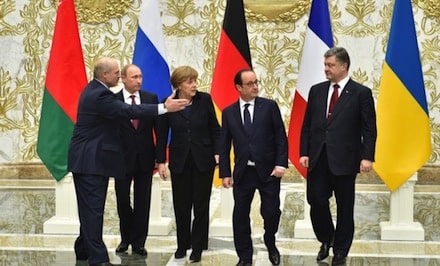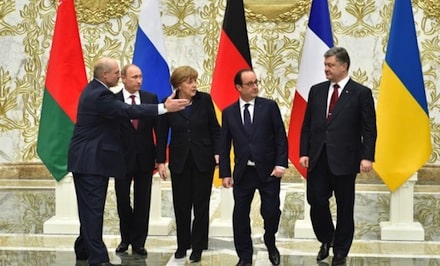
After a marathon 17 hour negotiation session, the leaders of Russia, Germany, France, and Ukraine agreed on an upgraded ceasefire plan, “Minsk II,” that lays out 13 points to be implemented by the west-backed government in Kiev and the independence-seeking regions in eastern Ukraine.
While there is much to be skeptical about in such an agreement — the devil is always in not just the details but especially in the interpretation of the agreement — there is one point of the plan that appears very much worth pondering.
According to a translation of the 13 points, point number ten reads:
All foreign troops, heavy weapons and mercenaries are to be withdrawn from Ukraine. Illegal armed groups would be disarmed, but local authorities in Donetsk and Lugansk would be allowed to have legal militia units.
There are two very significant points to ponder in this statement to which all sides agreed. First, it is most likely that when proposing this point, France and Germany, along with Kiev, were thinking of what they claim are as many as 10,500 regular Russian soldiers fighting inside Ukraine. For this point to be implemented and thus the plan carried out in good faith, the “10,500 Russians” as well as a handful of French and other volunteers for the breakaway regions must return home.
But the statement is unequivocal: All foreign troops must leave Ukraine.
What about US troops, including CIA and Special Forces, that are said to be assisting the US-backed government in Kiev? Would Kiev not have the same obligation to expel these foreign troops? And, most importantly, what of the 600 US paratroopers that are to be sent by President Obama to train the Ukrainian military starting next month?
Would it not be a violation of “Minsk II” ceasefire agreement for the US to go through with sending 600 troops into Ukraine?
The second important issue to consider about point ten of the agreement is the 10,500 regular Russian army troops that Kiev claims are fighting in the breakaway east. Russia has always maintained that this claim is a fiction and has called on Kiev and Washington to produce some evidence for the claim. Surely a satellite photo would easily prove such a claim.
However, something significant will happen either way on point ten of the agreement. There are three possibilities: either, 1) Russia will initiate a massive withdrawal of troops that will be easily visible to anyone watching; 2) Russia will not initiate a massive and easily visible withdrawal of troops from eastern Ukraine because it chooses to violate the “Minsk II” agreement; or, finally, 3) Russia will not initiate a massive withdrawal of troops from eastern Ukraine because there are no regular Russian army troops in eastern Ukraine.
In other words, point ten of the agreement is key to determine who is lying about Russian troops in eastern Ukraine.
Indeed, point ten appears a make or break issue in the agreement. Will Kiev break the agreement by allowing in 600 American troops — or even American weapons? Will Russia finally prove or disprove the claims made about the Russian military in Ukraine?
Something interesting is bound to happen soon. Don’t count on the western mainstream media to report it, however.

